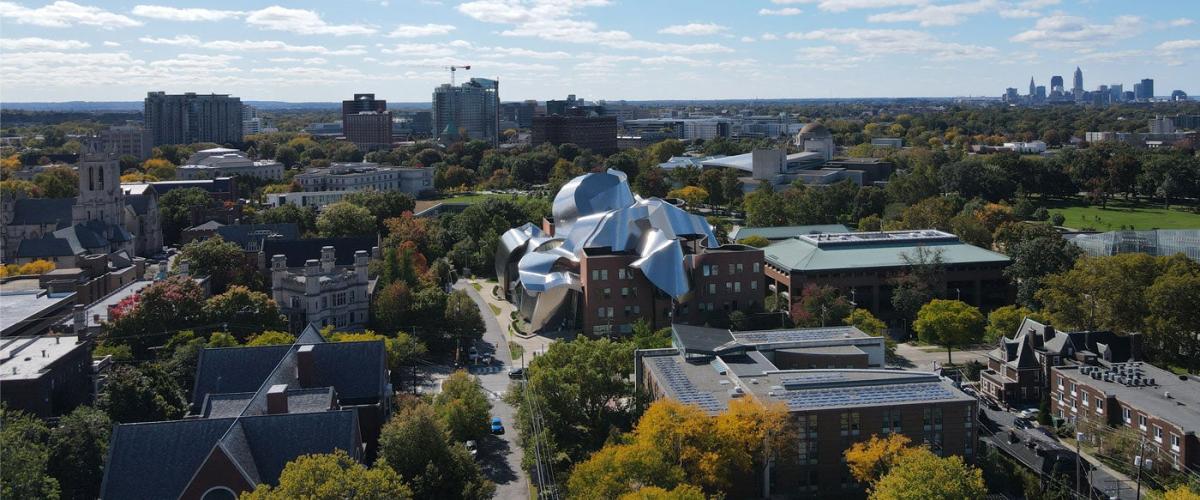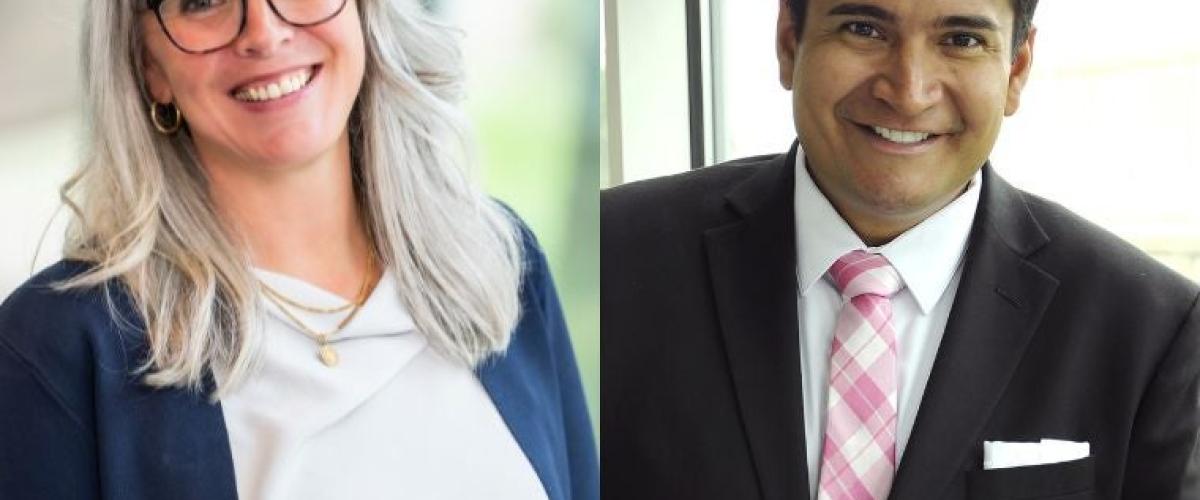Hispanic Heritage Month: Meet three Hispanic members of the CWRU community
From working in nursing at Cleveland Clinic to studying the impact of violence among youth, individuals of Hispanic heritage are engaged with countless facets of Case Western Reserve University.
In recognition of Hispanic Heritage Month, which takes place annually from Sept. 15 through Oct. 15, we're celebrating the accomplishments and experiences of three Hispanic members of the CWRU community. Discover more about their experiences at the university—and learn how their heritage has impacted their lives.
Answers have been edited for clarity and length.
Felipe Rodrigues
First-year Master of Laws student
After arriving in Ohio to pursue his Master of Laws (LLM) in U.S. and Global Legal Studies degree at the School of Law in 2023, Brazilian native Felipe Rodrigues faced the challenge of delaying his studies while awaiting a change of status approval. Though difficult, this setback motivated him to dedicate his career to making a difference in the lives of immigrants navigating similar struggles.
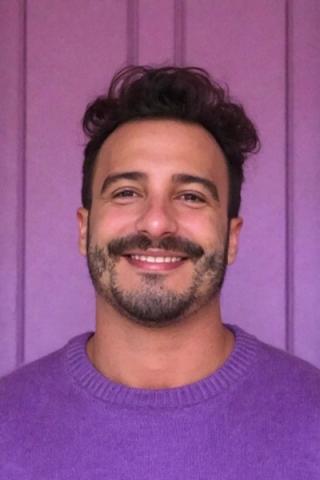
Rodrigues uses qualities instilled by his cultural background—including resilience, determination and adaptability—to fuel his goal of becoming the first dual-certified Brazilian American attorney with an Ohio bar license in Cleveland.
“As a Latino immigrant, I know what it feels like to face doubts or stereotypes,” said Rodrigues, who is now expected to graduate spring 2026. “That experience has given me a deeper empathy for the clients I now represent in immigration cases.”
Read more from Rodrigues.
Q: What does Hispanic Heritage Month mean to you personally?
For me, Hispanic Heritage Month is a celebration of resilience and accomplishment. It is a time to honor the history, strength and contributions of our communities, but also to confront stereotypes that often misrepresent us. Personally, it is a reminder that my journey—from Brazil to Cleveland—carries meaning not just for myself, but for others who may feel that their dreams are out of reach.
Q: In what ways do you celebrate or honor your heritage?
Food and music are at the heart of how I stay connected with my roots. Going to Batuqui, one of the best Brazilian restaurants in Ohio, and eating dishes like feijoada (a black bean stew) and pão de queijo (cheese bread) keep my heart warm. Small things that I incorporate into my daily life–like sharing Brazilian music with friends and family in Cleveland—allows me to challenge stereotypes and show that our culture is not only rich but also a source of strength and pride.
I also honor [my heritage] in a broader sense by using my platform as an attorney to show that Latin American immigrants are capable of excelling in highly skilled and respected professions. Living my own version of the American dream has little value if I cannot share it, and I want my professional journey to inspire other immigrants to pursue their own goals with confidence.
Q: What do you think the campus community should know about Hispanic heritage in general?
The campus community should understand that Hispanic heritage is deeply diverse, vibrant and filled with stories of perseverance. Too often, our communities are narrowly defined by stereotypes that overlook our talents and qualifications. Hispanic heritage is family, culture and excellency in what we do, which enriches both academic and professional spaces.
Sofia Castro
Fourth-year cognitive science student
A first-generation Mexican-American and the first in her family to attend college in the country, Sofia Castro is a fourth-year cognitive science student, with minors in chemistry and biology, in the combined bachelor’s and Master of Public Health program.
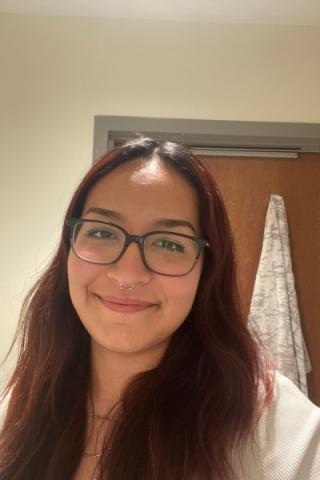
Drawing on her own experiences and identifying with underprivileged communities often at the center of health and advocacy conversations, Castro works to strengthen collaborations and foster inclusivity across campus—both through her studies and her leadership as a two-time president of the Undergraduate Diversity Collaborative (UDC).
“In this role, I am committed to supporting the people and 60+ organizations on our campus that contribute to making CWRU a welcoming space for all,” Castro said. “At UDC, we focus on ensuring every voice is heard and valued—much like I one day hope to do for my future patients.”
Read on to learn more about Castro.
Q: What does Hispanic Heritage Month mean to you personally?
To me, Hispanic Heritage Month is a time to pause, reflect and be especially mindful of the opportunities I’ve been given that my parents never had. I’m always conscious of the collaborative effort it has taken to get me to where I am today, and I feel immense gratitude toward my family and the community that has supported me every step of the way. Being [at CWRU], I feel that I get to show others that they also belong. This month is also a time to honor those sacrifices, carry the gratitude with me and to let it fuel my motivation to keep working hard and “echarle ganas” (or give it my all) toward my dreams.
Q: In what ways do you celebrate or honor your heritage?
So many aspects of Mexican culture are meaningful to me—from the art and music to the traditions and precolonial heritage. Honoring my heritage means continuing to learn, pursue my goals and seek out ways to give back to my Hispanic community. In many ways, the best way I celebrate my heritage is by fulfilling the opportunities and paths that have been opened to me. A fun fact about me is that I was part of a mariachi band for eight years, and it helped to deepen my appreciation for the richness and diversity of Hispanic traditions.
Q: What do you think the campus community should know about Hispanic heritage in general?
I think the campus community should know that there isn’t just one story, tradition or culture that defines it. There are so many countries, histories and experiences tied together—joining in that same shared sense of pride, resilience and community. At its core, Hispanic heritage involves honoring the past, celebrating the beauty of the present and the strength we bring into the future.
Daniel Alvarez
Third-year Juris Doctor candidate
As a husband, father, social worker and future attorney, Daniel Alvarez is committed to building a more compassionate and empathetic world—a mission that led him to Case Western Reserve University. Now a Juris Doctor (JD) candidate, Alvarez combines a legal education with his background as a licensed clinical social worker to better serve underserved communities.
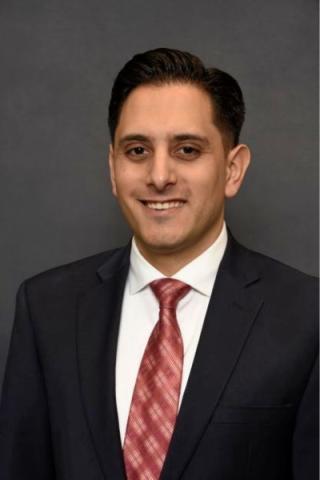
“I feel a profound responsibility to represent my community and uplift those who may not have the same access to resources or opportunities,” said Alvarez, a first-generation Colombian American from Miami, Florida.
On campus, Alvarez’s involvement includes participating in events hosted by the LatinX Law Student Association and Latin Graduate Student Association, which allows him to celebrate his heritage while forging lasting friendships. Alvarez also previously served as a student leader of CWRU’s former Envision Weekend, an early arrival program for incoming first-year students from underrepresented backgrounds, during the 2023 and ‘24 academic years.
Learn more about Alvarez.
Q: What does Hispanic Heritage Month mean to you personally?
As a first-generation Colombian American, Hispanic Heritage Month is deeply personal to me. It’s a time to honor the stories, sacrifices and perseverance of so many Latin Americans who have paved the way for Latinos in this country. It also recognizes those who left everything behind in their home countries to build a better life here. My parents are immigrants from Colombia, and Hispanic Heritage Month reminds me of their sacrifices, work ethic, and everything they did to build a life of opportunities for my brothers and me in the U.S. It also reminds me of their dedication to instilling in us a love for our roots and culture.
Q: How do you celebrate or honor your heritage?
I honor my heritage by living it every day through language, food, traditions, and the values my parents instilled in me. Spanish was the language of our home growing up, and today, it’s something that has been incredibly helpful in my work experiences throughout law school. During my internship at the law firm Sus Abogados Latinos in 2024, and now at the Cuyahoga County Public Defender’s Office, I’ve had the privilege of connecting with Spanish-speaking clients from Latin America and helping them feel seen and understood. I’m thankful every day that my parents emphasized the importance of being bilingual, and my wife and I are committed to passing down that same value to our son.
Music and dance are also deeply meaningful parts of our heritage. I grew up listening to artists like Carlos Vives, Shakira, and Juanes, whose music not only filled our home but also connected us to our roots. Now as a father, I hope to pass down these same traditions to my son and create meaningful experiences rooted in our culture.
Q: What do you think the campus community should know about Hispanic heritage in general?
Hispanic and Latin American heritage is vibrant, diverse, rooted in resilience and shaped by individuals and families who have overcome incredible challenges with strength and grit. This month reflects the passing down of our culture and identity through generations, and traditions that bring joy, unity, and meaning to our lives. It’s important for the campus community to understand that our heritage is woven into the fabric of this country, and our stories deserve to be heard and celebrated.
Hispanic Heritage Month, School of Law, College of Arts and Sciences, Featured, People


